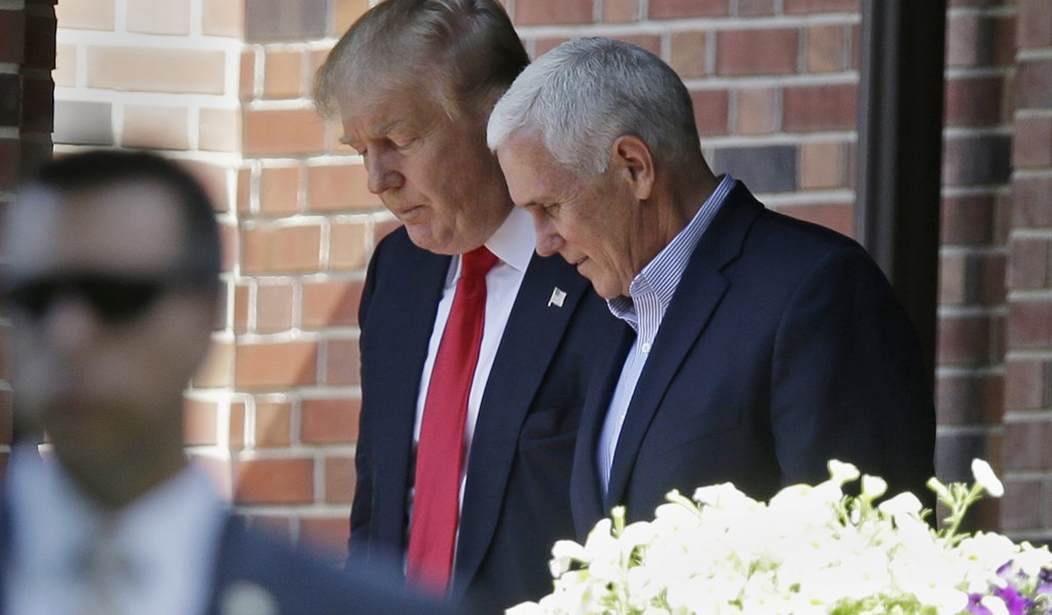The name Donald Trump will occupy the news cycle during the Republican National Convention in Cleveland, OH. Other than comments from oil entrepreneur Harold Hamm, energy won’t be a huge topic on the stage—though it does hold a spot on the newly approved Republican Platform and has a starring role in Trump’s plan to “make America great again.”
Trump calls it “An America First Energy Plan.” In it, he calls for “American energy dominance,” which he sees as a strategic, economic, and foreign policy goal. Like every recent president before him, he seeks “American energy independence”—which he defines as being “independent of any need to import energy from the OPEC cartel or any nations hostile to our interests.” According to his energy adviser, Rep. Kevin Cramer (R-ND), this acknowledges that we will still use oil from our friends like Canada and Mexico and that, for example, due to refinery configurations, there will likely continue to be oil imports and exports. The thing to note is that we will not need to, not have to, do business with those who are hostile toward America.
He understands that our amazing American energy resources offer the United States tremendous wealth and economic advantage. In his May 26 speech in North Dakota, addressing untapped oil and gas reserves on federal lands, Trump exclaimed: “We have no idea how rich we are. We want to cherish that wealth.” In comparison, he pointed out that Hillary Clinton wants to lock up “trillions in American wealth” while her “poverty-expansion agenda” enriches her friends and makes everyone else poor. (Be sure to read more about Hillary enriching her friends in my column next week.) In the speech, Trump pointed out to the audience, largely made up of people from the oil and agriculture industries: “If Crooked Hillary can shut down the mines, she can shut down your business, too.”
Recommended
His America First Energy Plan calls for a redirection of our energy agenda. Overall, Trump will move away from government-central planning efforts and return authority back to the states—an idea that has made it into the Republican Platform. His plan has three main components. Under a Trump administration there will be big changes in climate policy, regulations, and the management of federal lands.
Climate policy
While Trump is known to have called climate change “a hoax,” and has declared that he will not allow “political activists with extreme agendas” to write the rules, he is a true environmentalist. Coming from New York City where the only “nature” is Central Park, he has a heart for the environment. Cramer told me Trump holds a typical “Manhattan view of the West:” clean air, green space, and nature are precious. In his energy speech, Trump announced his environmental policy: “my priorities are very simple: clean air and clean water.” A Trump administration “will work with conservationists whose only agenda is protecting nature.”
In his “100-day action plan,” Trump says he’ll rescind the Climate Action Plan—which “gives foreign bureaucrats control over how much energy we use.”
[Note: this foreign control over energy use was a key component in the Brexit vote—as I wrote a few weeks ago. Since then, the UK’s new Prime Minister, who last week announced: “I want to see an energy policy that emphasises the reliability of supply and lower costs for users,” has scrapped the Department of Energy and Climate Change and replaced it with a new Department for Business, Energy & Industrial Strategy. With a President Trump, we can expect similar action.]
Trump has pledged to “cancel the Paris Climate Agreement and stop all payment of U.S. tax dollars to U.N. global warming programs.” He says such policies are evidence of America bending to benefit other nations at a cost to the U.S. Once the “draconian climate rules” are eliminated there is no rationale for imposing a “job-killing cap-and-trade” scheme or to keep extending the subsidies for wind and solar. He is not opposed to wind and solar energy, and in fact, wants to “get bureaucracy out of the way of innovation so we can pursue all forms of energy,” but he doesn’t support the idea of “the government picking winners and losers.” Like other energy sources, once the subsidies expire, the wind and solar industry would benefit from typical business tax deductions and deferments.
Regulations
Trump’s agenda calls for “Regulation reform that eliminates stupid rules that send our jobs overseas.” He knows that “costly regulation makes it harder and harder to turn a profit.”
In his speech, he accused the Environmental Protection Agency of “totalitarian tactics” and pointed out the current enforcement disparity: “The Department of Justice filed a lawsuit against seven North Dakota oil companies for the deaths of 28 birds while the Administration fast-tracked wind projects that kill more than 1 million birds a year.”
Cramer told me we can expect Trump to roll back a lot of Obama’s regulatory overreach and take a different approach toward rules, like the Waters of the U.S. and the Clean Power Plan, that are currently under a court-ordered stay.
Coal miners have come out en masse for Trump because of his promise to “save the coal industry.” I asked Cramer how Trump planned to do that. He told me that while coal-fueled power plants that have already been shut down or converted to natural gas will not likely be reopened, a Trump administration can save what’s left and stop the bleeding by not artificially punishing the industry through regulation.
On July 14, the U.S. House of Representatives passed the 2017 Department of Interior, Environment, and Related Agencies Appropriations Bill. It provides an example of actions we can expect from a President Trump. Cramer says if this bill were to make it to Trump’s desk, he would sign it. Some of the bill’s provisions include:
- Prohibiting the EPA from implementing new greenhouse gas regulations for new and existing power plants,
- Prohibiting harmful changes to the “stream buffer rule” or making changes to the definition of “fill material” negatively impacting coal-mining operations, and
- Requiring a report on the backlog of mining permits awaiting approval.
Additionally, the bill cuts funding for regulatory agencies—“a decrease of $64 million from last year’s budget and $1 billion below the President’s request.”
While the Obama Administration has issued near fatal regulations on the coal industry (which Hillary would take even further), other countries are using more coal. On July 11, the Financial Times announced that prices for coal surged on increasing demand in China.
In short, Trump explained: “Any future regulation will go through a simple test: is this regulation good for the American worker? If it doesn’t pass this test, the rule will not be approved.”
Federal Lands
In his speech, Trump reminded people that President Obama has halted leasing for new coal mines on federal lands and aggressively blocked the production of oil and natural gas by closing down leases and putting reserves off limits. He pointed out that these resources are an American treasure and that the American people are entitled to share in the riches.
One of the ways Americans will benefit from the riches of our natural resources is through a designated fund that, much like many natural resource states already do, will put a portion of the revenues directly into rebuilding roads, schools, and public infrastructure.
As a part of his 100-day action plan, Trump has promised to “lift moratoriums on energy production on federal areas.” Instead of slow-walking permits or being passive-aggressive with the permitting process, he’ll order agencies to expedite exploration, drilling, and mining permits.
Trump has said he intends to “trust local officials and local residents.” This idea will be played out in his approach to the management of federal lands—which Cramer explained will be more of a state and federal partnership where states will have a much greater say regarding the their land use. This includes the regulation of hydraulic fracturing. In a blow to the Obama administration’s overreach, a federal court recently affirmed that the regulation of the technology is the jurisdiction of the states—not the Federal Bureau of Land Management.
We’ll see this same philosophy played out in the designation of national monuments—something the Obama administration has abused by turning the ability to designate national monuments into a land grab. His monument designations often prevent productive use of the federal lands—such as agriculture or mineral extraction. The GOP platform committee adopted language that empowers states to retain control over lands within their borders. New monuments will “require the approval of the state where the national monument is designated or the national park is proposed.” As a result, Cramer told me: “We will not see a lot of new federal lands.”
There are two additional important energy items to note. First, Trump would “ask TransCanada to renew its permit application for the Keystone pipeline”—which would be built by American workers. Second, Trump has long been a supporter of nuclear power.
Trump’s energy plan is a turn toward realism. It is based on the fact that our American energy abundance can allow for shared prosperity, better schools, more funding for infrastructure, higher wages, and lower unemployment. Isn’t that what making America great again is all about?

























Join the conversation as a VIP Member